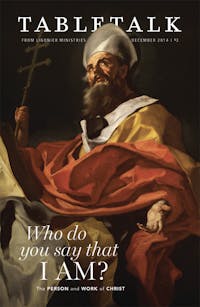
Request your free, three-month trial to Tabletalk magazine. You’ll receive the print issue monthly and gain immediate digital access to decades of archives. This trial is risk-free. No credit card required.
Try Tabletalk NowAlready receive Tabletalk magazine every month?
Verify your email address to gain unlimited access.
Christianity is a creedal religion. You cannot separate Christianity from its ancient creeds. In fact, every true Christian adheres to the ancient creeds of the church, whether he knows it or not. We all have creeds. Whether formal or informal—whether written or unwritten—in one way or another, we all have creeds in which our beliefs are expressed. Many Christians have formal, written creeds to which they adhere. Other professing Christians have informal, unwritten, and unorthodox creeds that can easily change and often do change according to the whims of the individual or his pastor.
Creeds are concise doctrinal summaries of the doctrines of Scripture, and creeds are subordinate to Scripture as our only infallible rule for faith and life. Although we do not by any means believe creeds are infallible, we do believe that creeds are authoritative insofar as they accurately summarize the teachings of Scripture. While we may not know all the creeds by heart, if we are Christians, we will wholeheartedly affirm them, confess them, and teach them to our children. For if we were to reject the church’s ancient creeds, we would be rejecting Christianity; and if we were to deny an essential creedal formulation about the person and work of Christ, we would be denying Christ.
On occasion, however, I have heard people passionately reply, “I don’t need the ancient creeds of the church—my only creed is Christ.” But as soon as I ask the question, “Which Christ?” they are quick to provide me with their personal creed about the person and work of Christ. Their personal creed is often heretical, unbiblical, and out of accord with the church’s ancient creeds. I will then patiently try to explain to them that if they do not believe in the Christ of Scripture but believe in a christ of their own making, they will find themselves among those to whom Christ will say, “Depart from me, for I never knew you.” For if it is the Christ of the Bible who saves us, we must affirm the one, true Christ of the Bible in order to truly possess the salvation of the God of the Bible.
Whenever we sing simple songs of faith to our children, such as “Jesus loves me this I know for the Bible tells me so,” we have formulated a creedal statement about Jesus, His love, the object of His love, our assurance of His love, and the nature of biblical authority. This is the aim of the ancient creeds as they pertain to the person and work of Christ; namely, to help us believe, confess, and proclaim the truth about Christ from sacred Scripture—which Christ Himself authored, fulfills, defends, and proclaims. If we are true Christians who have put our trust in the Christ of the Bible, it is impossible for us not to affirm the church’s ancient creedal statements on the Bible’s teaching. What’s more, we are living in a day when we must not only affirm them but defend them against the onslaught of heretical teachings about the person and work of Jesus Christ.
